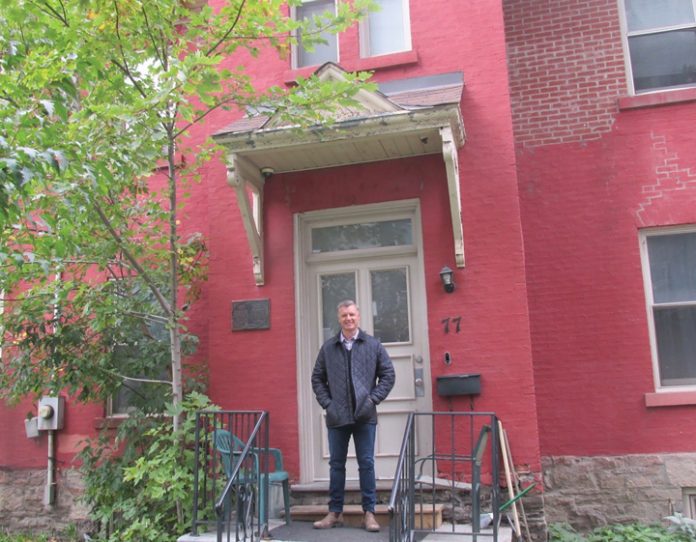By Charlie Senack
For almost four decades, Daybreak Housing has offered a sense of stability to some of the city’s most vulnerable residents.
Founded in 1982, the non-profit organization was started with the goal of providing affordable housing to those who struggle with complex issues, such as mental health and addictions. They also aim to help those who have escaped abuse or those who have limited life skills. In the years since, Daybreak has expanded to five houses with a total of 47 bedrooms, including Island Park, home to their only women’s residence.
“We get the vast majority of our residents through the Ottawa Housing Registry and referrals through organizations like the Royal Ottawa,” Richard Johnson, the operations manager at Daybreak, said. “They come to us desperate for housing with all kinds of issues, very sad stories.”
The demand for affordable housing is on the rise in the city, and the Daybreak team is feeling the effects. Johnson, who has served in his role for almost three years, said they now have a waiting list for the first time in Daybreak history.
“We have been full for about two years. We never had a waiting list before, but now I’ve got 30 or 40 people who have been interviewed and are waiting for housing,” he said. “Quite honestly, maybe one in 10 of the people I interviewed will actually see housing with us.”
The houses are congregate living settings. Each resident is given a fully furnished room but shares the common spaces with other housemates. They cook together, clean together and watch TV together, Johnson said.
When the first eight-room Daybreak house opened, it served only women but changed to a men-only facility two years later. Throughout the next decade and a half, they opened three more facilities located in the Sandyhill and Centretown neighbourhoods, also all for men.
But in September 2001, the Kitchissippi ward location opened near Island Park and Wellington, thanks to many community partnerships. The location has 12 women-only beds.
“It’s a lovely big house with a large garden,” said Johnson. “Some of our ladies work; they all shop in the Kitchissippi area and spend money in the shops. Several work in the area at some of the stores. You can see our residents on a daily basis on Wellington Street or anywhere.”
Like many organizations, Daybreak has seen higher operation costs during the COVID-19 pandemic, with added health and safety precautions in place. But thanks to support offered by the City of Ottawa, dealing with this unprecedented situation was made easier.
With the city’s financial support, Daybreak has been able to cover the costs of personal protective equipment, cleaning supplies, air purification units and cameras for security.
The City of Ottawa also helps Daybreak fund supportive housing. Residents are provided with safe, stable homes and the Daybreak team works with them to develop their life skills and helps them with potential work opportunities. Johnson said that the goal of this type of support is to offer stability and to help prepare residents for independent living as the next step.
Johnson said it’s been business as usual at the organization, even as the world shut down, because their residents continued to rely on their support.
“Very early on, when we were starting to get locked down and people were working from home, myself and the staff, we knew that we had to keep going,” he said. “We can’t avoid going to our houses. We have dealt with issues throughout, whether it be a repair to a house, a pest control issue, but generally it’s mental health issues within the house, fights within the house. We have to go in and deal with it.”
Running as a not-for-profit, Daybreak relies on community support and grants to keep operations running. They work with community health providers and various churches to help pay the bills, and also have some costs covered by the government.
But, that doesn’t always go far enough. As the need for affordable housing grows in Ottawa, Daybreak wants to grow. They also need to cover the costs of keeping their existing houses in working order.
“We seem to have enough clothes, books, DVDs and that type of thing right now, but money is what we need to grow,” says Johnson. “We need to generate money for any big fixes in the houses. If people are interested in Daybreak, they can make a donation.”
Johnson said Home Depot has donated supplies in the past to help with repairs. This fall, Ikea donated over $6,000 worth of furniture and home decor items.
Looking forward, Daybreak wants to open up more houses to help even more people.
“We have a strategic plan over the next two to five years to hopefully expand by 50 per cent, so say another 25 residents, whether that’s through one property or two properties,” said Johnson. “The board is very enthusiastic and that’s what we are looking to do. I am all for making it bigger. There is a need.”
To find out more about Daybreak or to make a donation, visit daybreakhousing.org.
